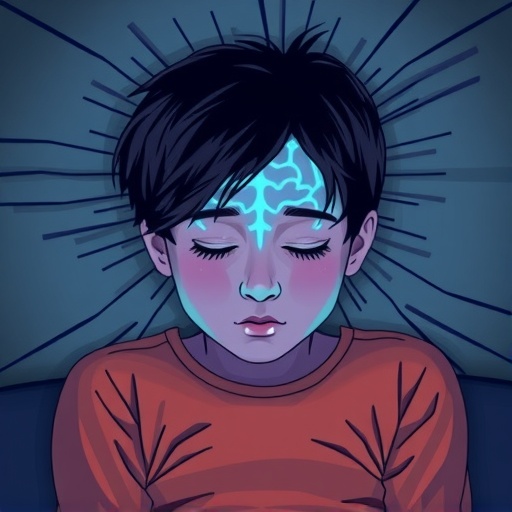Adolescence, a pivotal stage marked by rapid brain development and complex behavioral changes, is increasingly recognized as sensitive to the quality and quantity of sleep. Groundbreaking research from the University of Georgia now offers compelling evidence that sleep patterns during the teenage years directly influence brain connectivity and subsequent behavioral outcomes. This research, published in the journal Brain and Behavior, elucidates the neural underpinnings linking sleep deprivation with increased risk for mental health issues and conduct problems.
Adolescents notoriously struggle with sleep, often clocking fewer hours than recommended and experiencing fragmented, low-quality rest. The University of Georgia study leveraged data from more than 2,800 adolescents enrolled in the Adolescent Brain and Cognitive Development (ABCD) Study, the largest and most comprehensive longitudinal project investigating brain development and child health in the United States. Objective sleep metrics were gathered via wrist-worn Fitbit devices, which tracked sleep duration and efficiency over two weeks, providing unparalleled granularity in sleep behavior measurement.
The research team combined these data points with high-resolution brain imaging, focusing specifically on the Default Mode Network (DMN), a critical brain circuit involved in self-referential thinking, decision making, and emotional regulation. Using MRI scans, they identified distinct patterns of connectivity within the DMN and associated these neural signatures with measured sleep parameters. Strikingly, adolescents with reduced sleep duration and poorer sleep efficiency exhibited diminished connectivity in these brain regions, which are essential for developing cognitive control and emotional stability.
These neurological alterations have real-world implications. The diminished DMN connectivity correlated with an increased likelihood of problem behaviors, including impulsivity, aggression, and difficulty regulating emotions. These behaviors are known predictors of mental health disorders such as depression, attention deficit hyperactivity disorder (ADHD), and even schizophrenia. This mechanistic insight into how insufficient sleep disrupts brain functioning underscores the critical need to prioritize healthy sleep habits during adolescence.
The study also revealed demographic disparities in sleep patterns and their behavioral outcomes. Boys, older adolescents, and youth from minority racial backgrounds were disproportionately affected by sleep deprivation. These groups exhibited both shorter sleep durations and a higher incidence of behavioral problems over the course of the two to three-year follow-up period. This finding highlights how environmental and social factors might intersect with biological vulnerabilities, exacerbating risks for mental health issues in these populations.
Dr. Assaf Oshri, the corresponding author and a professor at the University of Georgia’s College of Family and Consumer Sciences, emphasized that sleep’s role extends far beyond just physical rest. “Sleep isn’t just good for children. It helps keep their mental health intact and helps them regulate their emotions,” Oshri said. The data strongly support the concept that variations in sleep duration and efficiency map onto distinct neural connectivity patterns that predict problematic conduct later in adolescence.
Linhao Zhang, the study’s lead author and recent doctoral graduate, pointed out the critical developmental window adolescence represents. “Adolescence is an extremely critical period for brain development,” Zhang explained. “And sleep is critical for brain development. But many adolescents don’t get enough quality sleep at night.” The study stresses not only how long adolescents sleep but also the quality of that sleep—how quickly they fall asleep, and whether they experience frequent awakenings, which can further disrupt brain homeostasis.
The neurobiological consequences of sleep deprivation during adolescence may contribute to a cascade of developmental challenges. Impaired connectivity within key brain networks like the DMN compromises the brain’s ability to integrate information and regulate affect. This may stifle the maturation of cognitive and emotional skills vital for navigating the complex social and academic demands faced by teens, ultimately leading to heightened vulnerability to mental illness.
Importantly, the University of Georgia study proposes actionable interventions. By targeting sleep health during adolescence, especially among at-risk groups such as boys and minority youth, it may be possible to prevent the emergence of conduct problems and psychiatric disorders. Sleep-focused preventative strategies, including behavioral modifications and environmental changes, hold promise as a non-invasive avenue to bolster adolescent brain health.
The innovative use of Fitbit technology to objectively quantify sleep over extended periods represents a methodological advancement, moving beyond self-reports and questionnaires traditionally used in sleep research. This objective tracking allows for more precise correlations between sleep metrics and brain function, enhancing the robustness of the data and lending credibility to the associations uncovered.
Furthermore, the longitudinal design of the study enables researchers to observe the developmental trajectory of both sleep patterns and behavioral manifestations over multiple years. This temporal component is critical to understanding how persistent sleep disruptions might snowball, leading to compounded impairments in brain connectivity and increasing the risk for psychopathology over time.
The collaborative effort, co-authored by experts including Charles Geier and Dr. Ellen House, integrates knowledge across human development, family sciences, and psychiatry. Such interdisciplinary perspectives are vital for translating neuroimaging and sleep data into public health policies and clinical strategies aimed at improving adolescent wellbeing at a population level.
In summary, this research cements the foundational role of sleep in adolescent brain development and mental health. It reveals the intricate dance between neural network connectivity and sleep health, painting a nuanced picture of how sleep deprivation can have cascading effects on behavior and psychological outcomes. Given the rising prevalence of sleep disturbances among teenagers globally, these findings ring an urgent call to action for parents, educators, healthcare professionals, and policymakers alike to prioritize sleep as a cornerstone of adolescent health.
Subject of Research: The relationship between adolescent sleep health, brain connectivity in the Default Mode Network, and the subsequent development of behavioral and mental health problems.
Article Title: Latent Default Mode Network Connectivity Patterns: Associations With Sleep Health and Adolescent Psychopathology
News Publication Date: 19-May-2025
Web References:
- https://onlinelibrary.wiley.com/doi/10.1002/brb3.70579
- https://www.fcs.uga.edu/people/bio/assaf-oshri
- https://www.fcs.uga.edu/
- https://www.gadevelopmentalscience.com/
- https://www.fcs.uga.edu/people/bio/charles-geier
- https://www.fcs.uga.edu/hdfs
- https://medicalpartnership.usg.edu/team_member/ellen-house-md/
- https://medicalpartnership.usg.edu/
References: University of Georgia research article published in Brain and Behavior, DOI: 10.1002/brb3.70579
Keywords: Sleep deprivation, Social development, Cognitive development, Emotional development




